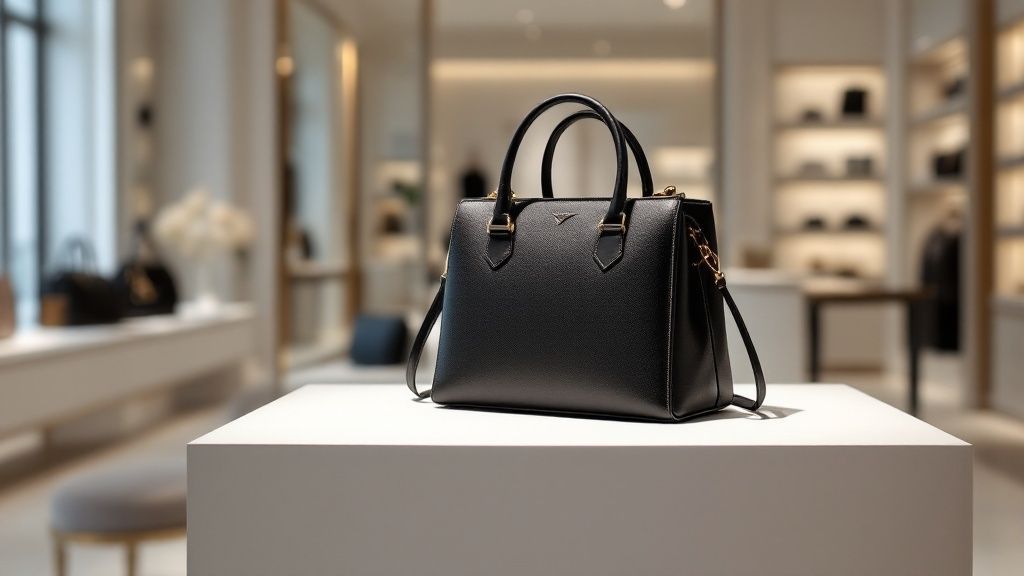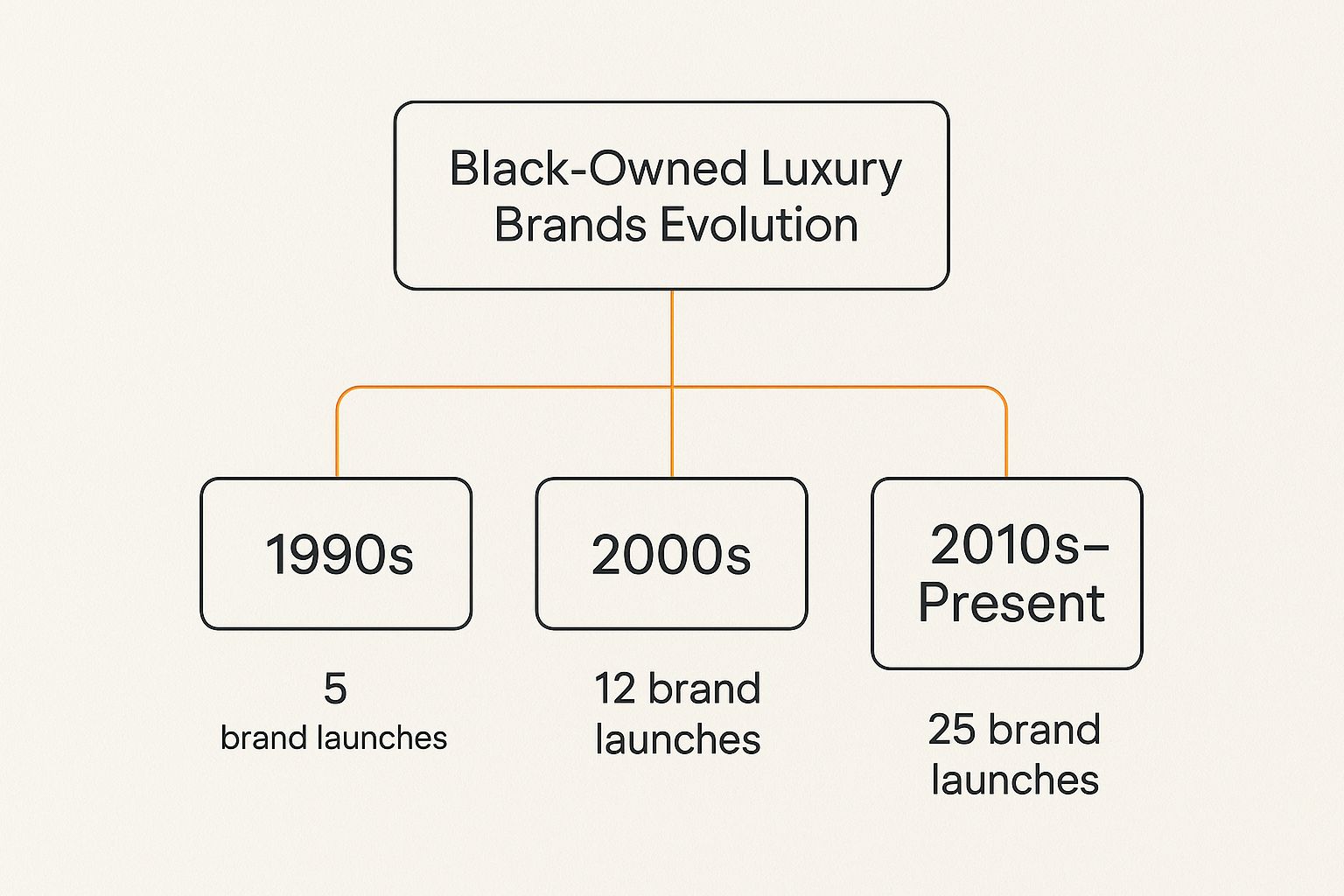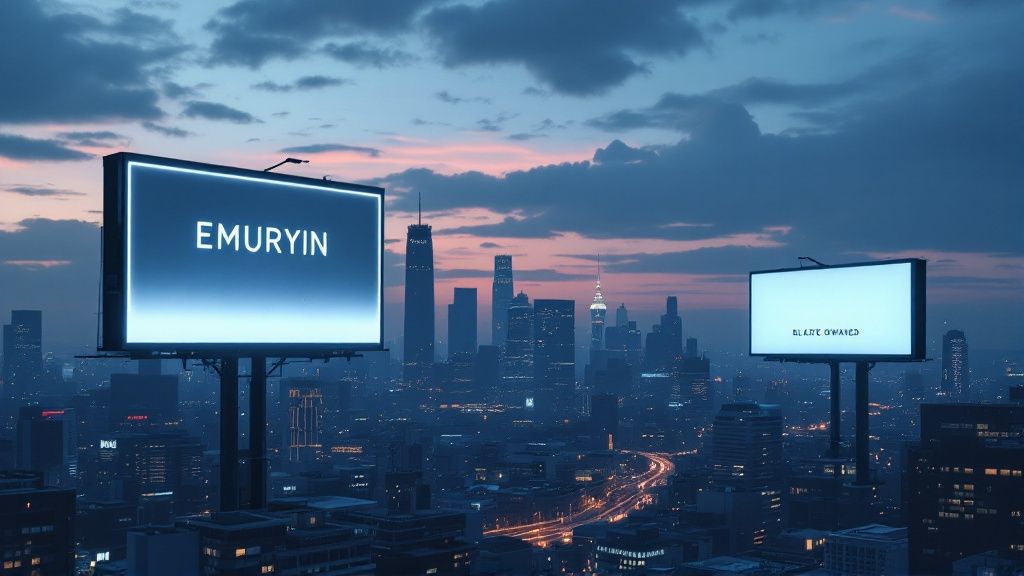A Guide to Black Owned Luxury Brands

What comes to mind when you hear the term "Black-owned luxury brand"? It’s more than just a label. We're talking about creators and companies that masterfully blend high-end craftsmanship with incredibly rich cultural storytelling.
This is a movement where quality, heritage, and identity are stitched into the very fabric of every product, whether it's fashion, beauty, or home decor. It’s luxury defined by its purpose, not just its price.
The New Definition of Luxury
For a long time, "luxury" conjured images of old-world European fashion houses. But that definition is being beautifully redefined. Today, true luxury is less about legacy names and more about connection, authenticity, and the story behind what you're buying. Black-owned luxury brands are leading this charge, reshaping the entire market with their distinct voices.
This modern vision of luxury really hinges on a few key ideas:
- Exceptional Craftsmanship: First and foremost, luxury has to be about quality. These brands are obsessive about using premium materials and meticulous techniques to create pieces that are meant to last a lifetime.
- Cultural Heritage: This is where things get truly special. Many designers infuse their work with powerful cultural narratives, celebrating Black history, art, and traditions in a way that feels both deeply personal and universally resonant.
- Authentic Storytelling: The "why" behind a brand has become just as important as the "what." People are drawn to the founders' journeys, their inspirations, and their dedication to their communities.
Moving Beyond the Price Tag
While top-tier materials and expert construction are a given, the real value of these brands goes so much deeper. When you support them, you're investing in a more inclusive and representative industry. You're choosing products that carry a profound meaning and reflect a genuine commitment to equity.
Luxury today is not just about owning something expensive; it’s about owning something meaningful. It's a statement of values, a celebration of artistry, and a connection to a compelling story that resonates on a personal level.
This shift proves that people are hungry for more than just status symbols. They want to align their spending with their values and make choices that actively empower underrepresented entrepreneurs.
The focus is no longer on exclusivity based on price, but on inclusivity built around shared stories and ideals. For anyone looking to dive into this world, finding that sweet spot between quality and cost is a great place to start. A good first step is exploring some of the most popular affordable luxury handbag brands to see how accessibility and high-end design can coexist. This evolution is what will allow the luxury market to finally become a space where diverse voices and powerful stories can truly shine.
Why Supporting Black Luxury Matters
Choosing to support a black owned luxury brand isn't just about making a fashion statement. It’s a deliberate choice with real, tangible impact. Every purchase you make sends a ripple effect through the industry, directly fueling economic empowerment and helping to build a more diverse and interesting luxury landscape. Think of it as investing in change, one beautiful piece at a time.
This goes far beyond a simple transaction. It's about joining a movement that champions equity and celebrates the richness of Black culture on a global stage.

Driving Economic Equity and Job Creation
Let’s talk about the bottom line. One of the most powerful reasons to support these brands is the role it plays in closing the racial wealth gap. Entrepreneurship has always been a primary driver of generational wealth, but Black founders have consistently run into roadblocks, from getting startup capital to simply getting their foot in the door.
Your purchase provides the real-world revenue these businesses need to grow, innovate, and create a lasting presence. That growth doesn't just benefit the founder; it creates a ripple effect. As these brands expand, they hire people, often from within their own communities, creating a cycle of opportunity and economic stability where it's needed most.
When you buy from a Black-owned luxury brand, you are directly investing in a founder's vision and their community's future. It's a conscious choice to redirect economic power and foster a more equitable business environment.
This means every dollar you spend is a vote for breaking down old barriers and building a more inclusive economy from the ground up.
Amplifying Cultural Narratives and Representation
Beyond the economics, these brands are crucial cultural storytellers. They bring fresh perspectives, rich traditions, and untold histories to the forefront of a luxury world that has often felt one-note. This is what authentic representation looks like.
By weaving their heritage into their designs—whether it’s a pattern inspired by West African textiles or a silhouette that pays homage to a figure in Black history—these creators are reclaiming their own narratives. This visibility matters for a few huge reasons:
- Inspiring Future Generations: When young people see successful Black designers and entrepreneurs, it shows them what's possible and encourages them to chase their own dreams.
- Educating a Global Audience: This work introduces diverse aesthetics to the mainstream, building cross-cultural appreciation and understanding.
- Authentic Storytelling: It puts the power of the narrative back into the hands of those who lived it, which is the best defense against cultural appropriation.
If you're looking for accessories that beautifully merge style with substance, checking out a curated list of Black-owned purse companies is a great place to start discovering designers who are making their mark.
Fostering Innovation and Redefining Industry Standards
Supporting Black-owned luxury brands also pushes the entire industry forward. These entrepreneurs often see gaps in the market that legacy brands have ignored for years. Just think of the beauty brands that finally created foundations for a full spectrum of skin tones, or fashion labels that design for a truly inclusive range of body types.
These fresh perspectives don't just fill a niche; they force the whole industry to pay attention and adapt. When a Black-owned brand proves there's a huge, untapped market for more inclusive products, the big corporations start to follow. It's a form of leadership that raises the bar for everyone, pushing the very definition of luxury to be more modern, representative, and focused on what real customers actually want.
How Trailblazers Are Reshaping the Market
The luxury market was, for a very long time, a predictable world dominated by a few legendary houses. But that's changing. Fast. A new wave of trailblazing founders behind Black-owned luxury brands is shaking things up, not just by entering the industry, but by fundamentally rewriting the rules.
These innovators are doing far more than just designing beautiful things; they're building brands with deep cultural roots and compelling stories. By doing so, they're proving that authenticity and heritage are two of the most powerful assets a modern luxury brand can have. They weave personal history and cultural touchstones into their collections, forcing the entire industry to take a hard look at what "style" and "exclusivity" really mean today.
The Power of Authentic Cultural Fusion
One of the most exciting things about these brands is how they masterfully blend their cultural heritage with cutting-edge, contemporary design. It’s a bit like a world-class chef taking a beloved family recipe and elevating it with modern techniques—the result is something that feels both wonderfully familiar and thrillingly new.
This fusion creates a brand identity that’s almost impossible for legacy companies to replicate authentically. Instead of simply borrowing from other cultures, these creators are celebrating their own. They translate their lived experiences into fashion, beauty, and art that connects with people on a much deeper level.
Consumers are tired of generic luxury; they want products with a real story. Many prominent African American handbag designers, for instance, draw directly from their heritage to create pieces that are truly one-of-a-kind.
These brands aren't just selling products; they are offering a piece of their story. This shift from transactional luxury to narrative-driven luxury is a powerful force that is making the entire industry more dynamic and representative.
Setting New Benchmarks for Inclusivity
Perhaps the most profound impact these entrepreneurs have had is in setting a new, higher standard for inclusivity. For decades, the luxury world catered to a very narrow demographic, but the rise of Black-owned brands has completely upended that model.
Since around 2019, brands like Rihanna's Fenty have kicked off a new era, proving that inclusivity isn't a buzzword—it's a business model. Fenty's groundbreaking range of foundation shades and inclusive sizing didn’t just fill a gap in the market; it set a new benchmark that competitors had to scramble to meet. This commitment is woven into the DNA of these brands, from the initial product concept to the final marketing campaign, addressing needs that were ignored for far too long.
The image below gives you a real sense of this momentum, showing just how much growth we've seen in Black-owned luxury brand launches over the past 30 years.

As you can see, the growth is accelerating dramatically. The number of new brands launched in the last decade alone is more than double the total from the previous two decades combined. This isn't just a trend; it's a powerful market response to a clear and growing demand for luxury that truly reflects the world we live in.
The Economic Power of the Black Consumer
The rise of Black-owned luxury brands isn't happening in a vacuum. It’s a direct response to a powerful, discerning market that has been underestimated for far too long: the Black consumer. This group isn't just a participant in the luxury space; they are actively shaping its future with serious economic clout and a clear demand for genuine representation.
To really get what's happening, you have to look past surface-level trends. Black consumers in the United States alone wield a collective buying power of over $1.6 trillion annually. That incredible economic engine is increasingly being pointed toward brands that reflect their values, heritage, and identity. This isn't just about buying things; it's about finding a real connection.

Driving Demand with Cultural Authenticity
For many Black consumers, purchasing decisions are deeply personal and tied to cultural identity. There's a powerful desire to support entrepreneurs from their own community—people who create products that resonate with their lived experiences. This isn't just a gut feeling; the data shows a clear market shift is underway.
For instance, research reveals that Black consumers are up to 2.3 times more likely to switch to Black-owned apparel or footwear brands. That’s not a small number. It points to a strong commitment to cultural alignment in their shopping habits. What's more, spending in these areas is expected to grow by about 6% annually, hitting an estimated $70 billion by 2030. That’s a sustained, growing market. You can read the full research about these consumer trends to learn more.
This whole movement signals a fundamental change. It’s telling the entire industry that representation and cultural relevance aren't just feel-good social ideals; they are a cornerstone of smart business.
Brand Loyalty and High Engagement
Another defining trait of this consumer base is its incredible brand loyalty. When Black consumers feel seen, respected, and authentically represented by a brand, they don't just become customers—they become advocates. Their support goes way beyond repeat purchases and into true community building.
The connection between Black consumers and brands that champion their culture is not transactional; it's relational. This deep-seated loyalty translates into higher engagement, influential word-of-mouth marketing, and a stable customer base that legacy brands often struggle to build.
This dynamic creates a powerful cycle. As consumers champion these brands, the brands get the resources to innovate, create even more representative products, and deepen their community roots. It's a symbiotic relationship, and it's precisely why the demand for Black-owned luxury is more than just a passing trend. It's a sustainable market force, powered by a community that knows its economic strength. The message couldn't be clearer: authentic connection drives commerce.
Groundbreaking Innovations in Black Owned Beauty
The beauty world has been completely shaken up, and it's largely thanks to the brilliant minds behind today's Black-owned luxury brands. We're talking about more than just finally getting foundation shades right. These entrepreneurs are rewriting the rules of beauty science, creating formulas from the ground up that truly understand and cater to melanin-rich skin and a whole world of diverse hair textures.
They aren't just plugging holes in the market; they're inventing entirely new product categories.
It all comes down to creating products that actually work. Think of skincare lines meticulously designed to tackle hyperpigmentation, a common concern for deeper skin tones. Or haircare that doesn't just manage natural textures but celebrates them with nourishing, scientifically proven ingredients. This is about moving past the empty promises of inclusivity and delivering real, tangible results, which in turn builds incredible trust with customers who've been ignored for far too long.
How Community and Social Media Changed the Game
Social media completely leveled the playing field. It gave these brands a way to sidestep the industry's traditional gatekeepers and speak directly to the people who matter most: their customers. Platforms like TikTok and Instagram have become more than just marketing channels; they're digital hubs where founders can teach people about their unique needs, share their own journeys, and build communities that are fiercely loyal.
Having that direct line is unbelievably powerful. It means getting instant feedback, sometimes even developing new products hand-in-hand with their followers, and watching a product go viral thanks to genuine, word-of-mouth buzz. That's a kind of authentic connection legacy brands can only dream of.
By forging real relationships and offering products that deliver, these beauty innovators have done more than just build a customer list. They’ve nurtured dedicated communities where people finally feel seen, heard, and celebrated.
This community-first mindset has led to some staggering growth. Just look at 2024: Danessa Myricks Beauty saw its earned media value shoot up by 74%, an explosion driven by multi-use products that took over social media. The skincare brand Topicals saw a similar 74% year-over-year leap by focusing on chronic skin conditions like eczema, proving just how huge the demand is for specialized solutions. You can dive deeper into the growth of Black-owned beauty brands to get the full story.
Redefining Beauty From the Inside Out
At the end of the day, the biggest innovation here is a cultural one. These brands are tearing down outdated, narrow-minded beauty standards and championing a vision of beauty that’s far more inclusive and real. They’re giving people the power to feel good in their own skin by making products that work with their natural features, not against them.
This change is happening in a few key ways:
- Science-First Formulas: They put the focus on ingredients and research specifically proven to be effective for melanin-rich skin.
- A Celebration of Natural Hair: They're creating top-tier products that nourish and style coily, curly, and kinky hair textures beautifully.
- Real Representation: Their marketing features models that look like their actual customers, and their brand stories are built around the voices of their community.
By holding these values at their core, Black-owned luxury beauty brands are doing more than just selling makeup or skincare. They're leading a movement. They're showing the world that true luxury isn't about a price tag—it's about seeing yourself reflected on the shelf, celebrating who you are, and having access to products made with you in mind.
Frequently Asked Questions

As you start to explore the world of Black-owned luxury, a few questions naturally pop up. I've gathered some of the most common ones here to give you clear, straightforward answers. My hope is to make your journey into this space feel both exciting and informed.
Think of this as a practical guide to help you connect with these incredible brands and make choices that feel good and align with your values. Let's get into it.
How Can I Verify a Brand Is Black Owned?
Knowing your support is going to the right place is essential. The best way to confirm a brand's ownership is usually the most direct: check the "About Us" or "Our Story" page on their website. Most founders are incredibly proud of their heritage and share their journey openly.
Beyond that, there are fantastic resources dedicated to this very cause. Online directories like Official Black Wall Street or WeBuyBlack.com have done the work for you, curating extensive lists. I also recommend following Black creators, editors, and culture-focused media outlets on social media—they’re always the first to highlight authentic brands.
When a brand’s identity and mission are front and center, you can usually trust it. Look for the creators who celebrate their story, because it’s not just a background detail—it’s the heart of their brand.
A little digging ensures your money makes the impact you intend.
Are Black Owned Luxury Brands More Expensive?
It's a common misconception that "luxury" automatically means an astronomical price tag. In reality, the term is far more about exceptional craftsmanship, high-quality materials, and originality.
Just like the broader luxury market, Black-owned luxury brands exist across a spectrum. Some create bespoke, couture-level pieces, while many others focus on what I'd call "accessible luxury." The price you see is a reflection of real value.
It accounts for things like:
- Premium Materials: Sourcing top-tier leathers, silks, or organic ingredients.
- Ethical Production: Committing to fair wages and sustainable practices.
- Artisanal Craftsmanship: The immense skill and time poured into each item.
- Unique Designs: The brilliance of a one-of-a-kind, culturally resonant idea.
When you buy from these brands, you’re not just paying for a label. You’re investing in a piece of art with a powerful story, built to last.
Where Can I Discover New and Emerging Brands?
This is the fun part! Finding new talent before everyone else does is a real thrill. Social media is your best friend here, especially Instagram and TikTok. Start by following hashtags like #BlackOwnedLuxury, #BuyBlack, and #BlackDesigners to see a constant stream of newness.
Another pro-tip is to follow stylists, fashion editors, and influencers who are known for championing diversity. They have their finger on the pulse and often feature rising stars on their platforms. Signing up for newsletters from publications centered on Black fashion and culture is also a great way to stay in the know and discover the next big thing.
At The Bag Icon, we believe that everyone deserves to experience the confidence that comes with a beautifully crafted handbag. Our collections merge timeless style with accessible luxury, allowing you to invest in quality without compromise. Explore our curated selection of leather handbags and find your perfect statement piece today at The Bag Icon.



Comments